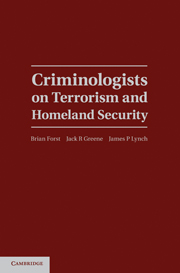Book contents
- Frontmatter
- Contents
- About the Authors
- Preface
- 1 Introduction and Overview
- PART I NATURE OF THE PROBLEM
- PART II STRATEGIES FOR INTERVENTION
- 7 Is Crime Prevention Relevant to Counterterrorism?
- 8 Implications of Opportunity Theory for Combating Terrorism
- 9 Soldiers and Spies, Police and Detectives
- 10 Community Policing and Terrorism
- 11 Go Analyze!
- 12 Managing the Fear of Terrorism
- 13 Should Profiling Be Used to Prevent Terrorism?
- 14 Federal-Local Coordination in Homeland Security
- 15 Liberty and Security in an Era of Terrorism
- 16 Regulating Terrorism
- PART III THINKING ABOUT TOMORROW
- Index
- References
7 - Is Crime Prevention Relevant to Counterterrorism?
Published online by Cambridge University Press: 04 February 2011
- Frontmatter
- Contents
- About the Authors
- Preface
- 1 Introduction and Overview
- PART I NATURE OF THE PROBLEM
- PART II STRATEGIES FOR INTERVENTION
- 7 Is Crime Prevention Relevant to Counterterrorism?
- 8 Implications of Opportunity Theory for Combating Terrorism
- 9 Soldiers and Spies, Police and Detectives
- 10 Community Policing and Terrorism
- 11 Go Analyze!
- 12 Managing the Fear of Terrorism
- 13 Should Profiling Be Used to Prevent Terrorism?
- 14 Federal-Local Coordination in Homeland Security
- 15 Liberty and Security in an Era of Terrorism
- 16 Regulating Terrorism
- PART III THINKING ABOUT TOMORROW
- Index
- References
Summary
INTRODUCTION
Is the practice of crime prevention – as well as its scholarship, discourse, tools, institutions, and perspectives – relevant to countering terrorism? Substantive concerns have been expressed about differences between terrorism and crime, both in definition and nature, and accordingly between applying crime prevention strategies and tactics to counterterrorism (for a review of some of these arguments, see Deflem, 2004; LaFree and Dugan, 2004; Mythen and Walklate, 2005; Rosenfeld, 2004). On the one hand, terrorism – commonly defined as violence motivated by political and/or religious ideology, with intentions of creating mass casualties and/or public fear – is a unique type of violence, with extralegal, political, and social elements that diverge from the characteristics of everyday forms of crime. The applications of crime prevention strategies, which mostly include schemes that block very common forms of deviant behavior, could be too weak to be applied to terrorism, or so general and far reaching that their use might lead to costs of freedom and livelihood that greatly outweigh benefits.
Further, the most promising counterterrorism approaches may lie outside the criminologist's purview and expertise, involving international diplomacy, economic or political sanctions, technological or military solutions, or the transformation of religious institutions. In Northern Ireland, for example, a number of policing strategies used against the Irish Republican Army (IRA) were seen as exacerbating rather than alleviating IRA terrorism (McGarry and O'Leary, 1999; Tonge, 2002).
- Type
- Chapter
- Information
- Criminologists on Terrorism and Homeland Security , pp. 129 - 150Publisher: Cambridge University PressPrint publication year: 2011
References
- 8
- Cited by

